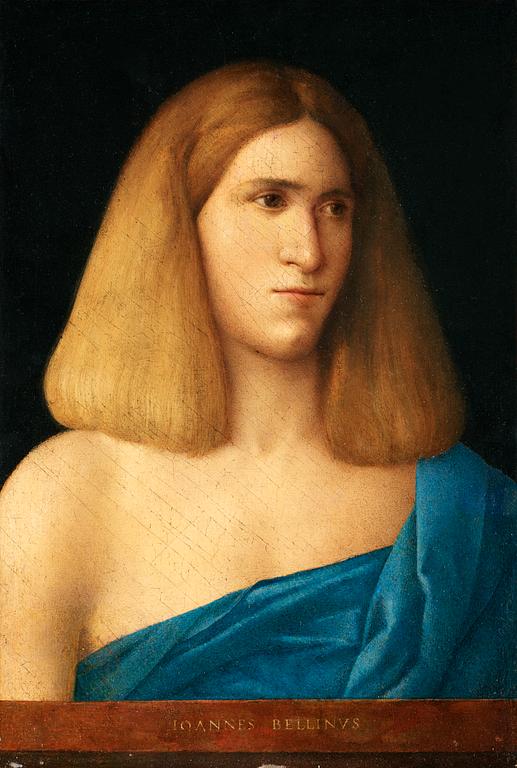Giovanni Bellini
Porträtt av yngling, bystbild
Signerad Ioannes Bellinvs. Pannå 42,5 x 29 cm.
Proveniens
Victor Martin Le Roy (1842-1918) and by descent; Paris, Gallerie Charpentier, 4 December, 1956, lot 13, as Ecole Vénitienne.
Litteratur
A Pératé, in Catalogue raisonné de la collection Martin Le Roy, V, Paris, 1909, pp 43-44, no 13, pl XI, as by Marco Basaiti.
G Migeon, "La Collection de Martin Le Roy", Les Art, X, November 1902, pp 7-8, illustrated, as by Basiati.
G Lorenzetti, "Catalogue raisonné de la collextion Martin Le Roy", L'Arte, xiii, 1910, p 236, as by Basaiti.
S Reinach, "Répertoire de peinture du moyen âge et de la Renaissance (1280-1580)", IV, Paris, 1918, p 689, no 1, illustrated (line engraving), as Basaiti.
G Gronau, "Giovanni Bellini", Stuttgart, 1930, p 216, no 165, illustrated, as a late work by Giovanni Bellini.
R van Marle, "The Development of the Italian Schools of Painting", XVII, The Hague, 1935, p 497, as by Basaiti.
B Berenson, "Pitture italiane del rinascimento", Milan, 1936, p 62, as a late work by Giovanni Bellini.
C Gamba, "Giovanni Bellini", Milan, 1937, p 173.
L Dussler, "Giovanni Bellini", Vienna, 1949, pp 73-74.
B Berenson, "Italian Pictures of the Renaissance: Venetian School", London, 1957, I, p 33, as a late work by Giovanni Bellini.
F Heinemann, "Giovanni Bellini e i Belliniani", Venice, 1962, I, p 231, no V.94, II, fig 591, as by Giovanni Cariani.
Övrig information
This portrait, as Keith Christiansen points out, is of a young man dressed "all'antica". Despite former attrubutions to both Basaiti and Cariani, the picture may well be by Bellini himself, as the quality of the better preserved passages in the face and the drapery suggests.
Christiansen notes similarities with the "Infant Bacchus" at Washington (National Gallery of Art, no 1362) wich relares to "The Feast of the Gods", also at Washington (no 597) and evidently of similar date, 1514. The present portrait accommodating himself to the taste of a younger generation.
While the majority of hs portraits use to device of a frontal parapet and some are signed in a very similar way (ie those in the Uffizi, Florence, no 354, in the Pinacoteca Capitolina, Rome no 47, and at Washington, no 365-most conveniently illustrated by Heinemann, figs 126, 128 and 129), none is precisely comparable in "all'antica" presentation, wich presumably represented a whim of the youngish sitter. A parallel is offered by the so-called "Portrait of a Humanist", formerly attributed to Bellini, in the Castello Sforzesco, Milan, no 248 (Heinemann, fig 850)






























